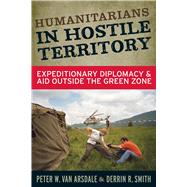
Note: Supplemental materials are not guaranteed with Rental or Used book purchases.
Purchase Benefits
Looking to rent a book? Rent Humanitarians in Hostile Territory: Expeditionary Diplomacy and Aid Outside the Green Zone [ISBN: 9781598744446] for the semester, quarter, and short term or search our site for other textbooks by Van Arsdale,Peter W. Renting a textbook can save you up to 90% from the cost of buying.
| List of Illustrations | p. 9 |
| List of Acronyms | p. 11 |
| Preface and Acknowledgments | p. 17 |
| Setting the Stage | p. 27 |
| Humanitarianism, Development, and Intervention | p. 29 |
| A Moral Template | p. 29 |
| The Humanitarian Enterprise | p. 35 |
| The Development Enterprise | p. 45 |
| Warriors, Builders, Chaplains, and Humanitarians | p. 54 |
| Box: Engineering Aid in Afghanistan | p. 57 |
| Types of Change and Intervention | p. 58 |
| An Ethics of Cooperation and Intervention | p. 65 |
| The Reciprocity of Humanitarianism and Development | p. 67 |
| Outside the Green Zone: Nonpermissive Areas of Operation | p. 71 |
| The Green Zone | p. 71 |
| ôCountry Operationsö and ôCountry Teamsö | p. 73 |
| Humanitarianism and Warfare | p. 76 |
| The Accidental War: The 2006 Crisis between Israel and Lebanon | p. 82 |
| Armed and Unarmed NSAs | p. 93 |
| The Privatization of War | p. 97 |
| In-Situ Preliminary Assessments, Threat Analyses, and Kofi Annan's Lessons | p. 103 |
| The Necessity of Preliminary Assessments | p. 105 |
| Box: Tigrayan Water Systems | p. 112 |
| Provincial Reconstruction Teams (PRTs) | p. 115 |
| The Country Operations Plan | p. 117 |
| Preliminary Assessments and Humanitarian Interventions | p. 120 |
| Threat, Risk, and Vulnerability Analyses | p. 121 |
| Box: Salvadoran Water Resources | p. 127 |
| Kofi Annan's Lessons | p. 130 |
| On Site, in Action | p. 133 |
| Training and Equipping for Deployment | p. 135 |
| Personal Preparedness | p. 135 |
| Equipment Needs and Checklists | p. 145 |
| Box: Operation Jaque | p. 149 |
| Training Protocols | p. 151 |
| Self-Doctoring Kits and Medical Training | p. 157 |
| Legal Checklists | p. 160 |
| Transit Operations, Communications, and Smart Technologies | p. 161 |
| Transit Operations: Always Necessary, Often Controversial | p. 161 |
| Planning for Threats: Obviously Needed, Occasionally Ignored | p. 171 |
| Box: Ubiquitous Threats | p. 175 |
| Communications | p. 177 |
| Smart Technologies and Electronic Innovations | p. 182 |
| Message Dissemination and Public Relations | p. 188 |
| Best Practices for Hazardous Areas of Operation: Fixed Sites and Field Schools | p. 191 |
| Military Fortresses, Bases, and Camps | p. 191 |
| Romanian Military Camps and Operations | p. 196 |
| Fixing Perimeters, Establishing Sites, and Securing Operations | p. 212 |
| Permanent Urban Facilities | p. 215 |
| Permanent Rural Facilities | p. 220 |
| Permanent Remote Facilities | p. 225 |
| Temporary Remote Operations | p. 227 |
| Disengagement | p. 229 |
| Applications and Implications | p. 231 |
| Foreign Service, Tribal Outreach, and Special Operations | p. 233 |
| The United States Foreign Service | p. 234 |
| Tribal Outreach and Transition | p. 238 |
| Three Case Studies | p. 240 |
| Box: Best Practices, Lessons Learned #1 | p. 248 |
| Box: Best Practices, Lessons Learned #2 | p. 249 |
| The Battle for Anbar Province | p. 251 |
| Box: Best Practices, Lessons Learned #3 | p. 257 |
| Special Operations | p. 261 |
| Box: The Roles and Methods of HTTs | p. 271 |
| Sustaining Operations through DEFTs | p. 273 |
| Conclusion: Back to the Future | p. 277 |
| A Non-Ideological Stance | p. 277 |
| Civil Society and Pragmatic Humanitarianism | p. 281 |
| The Co-Evolution of Warfare and Humanitarianism | p. 282 |
| Anthropology and the Military | p. 287 |
| Scenarios and Simulations | p. 297 |
| Coming Full Circle | p. 300 |
| Appendix | p. 303 |
| References | p. 321 |
| Index | p. 339 |
| About the Authors | p. 351 |
| Table of Contents provided by Ingram. All Rights Reserved. |
The New copy of this book will include any supplemental materials advertised. Please check the title of the book to determine if it should include any access cards, study guides, lab manuals, CDs, etc.
The Used, Rental and eBook copies of this book are not guaranteed to include any supplemental materials. Typically, only the book itself is included. This is true even if the title states it includes any access cards, study guides, lab manuals, CDs, etc.